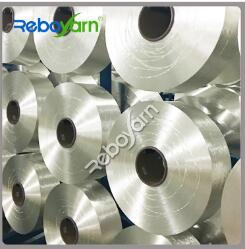Recycled Polyester Yarn: Innovations and Future Prospects
2024-07-24
As the world grapples with the environmental challenges posed by plastic waste and the need for sustainable materials, recycled polyester yarn (rPET) has emerged as a beacon of innovation in the textile industry. This blog delves into the latest innovations in recycled polyester yarn and explores its future prospects, highlighting how this sustainable material is shaping the future of textiles.

Innovations in Recycled Polyester Yarn
1. Advanced Recycling Technologies: Recent advancements in recycling technologies have significantly improved the quality and efficiency of recycled polyester yarn production. Enhanced cleaning and sorting processes, along with advanced melting and extrusion techniques, result in higher-quality yarn with fewer impurities. These innovations ensure that rPET yarn meets the stringent requirements of modern textile applications.
2. Chemical Recycling: Unlike mechanical recycling, which involves melting and re-extruding plastic, chemical recycling breaks down plastic waste into its molecular components. This process allows for the production of recycled polyester yarn with properties that closely match those of virgin polyester. Chemical recycling also has the potential to recycle a wider range of plastics, including those that are difficult to process mechanically.
3. Blending with Natural Fibers: Innovations in blending recycled polyester with natural fibers, such as organic cotton, wool, and hemp, have led to the creation of hybrid yarns that combine the best attributes of both materials. These blended yarns offer enhanced comfort, breathability, and sustainability, catering to the growing demand for eco-friendly and high-performance textiles.
4. Microfiber Shedding Solutions: One of the concerns with synthetic fibers, including recycled polyester, is microfiber shedding during washing, which contributes to microplastic pollution. Researchers and manufacturers are developing solutions to minimize microfiber release, such as coating technologies, fabric treatments, and improved yarn structures. These innovations aim to make recycled polyester yarn even more environmentally friendly.
Future Prospects of Recycled Polyester Yarn
1. Increased Adoption in Fashion: As consumers become more environmentally conscious, fashion brands are increasingly adopting recycled polyester yarn in their collections. High-profile collaborations and sustainability initiatives are driving the adoption of rPET yarn, with many brands committing to using recycled materials in a significant portion of their products.
2. Expansion in Technical Textiles: Beyond fashion, recycled polyester yarn is gaining traction in technical textiles, including automotive interiors, geotextiles, and industrial fabrics. Its durability, versatility, and sustainability make it an attractive choice for various technical applications, where performance and environmental impact are critical considerations.
3. Circular Economy Initiatives: The concept of a circular economy, where products are designed for longevity and recyclability, is gaining momentum. Recycled polyester yarn is a key component of this vision, as it embodies the principles of resource conservation and waste reduction. Industry stakeholders are increasingly collaborating to create closed-loop systems, where textiles can be continuously recycled into new products.
4. Policy and Regulatory Support: Governments and regulatory bodies worldwide are recognizing the importance of sustainable materials and are introducing policies to support the use of recycled content in textiles. Incentives, standards, and certifications for recycled materials are expected to drive further growth in the recycled polyester yarn market.
Conclusion
Recycled polyester yarn is at the forefront of the sustainable textile revolution, driven by innovations in recycling technologies, blending techniques, and environmental solutions. As the industry continues to evolve, the adoption of rPET yarn is set to expand across fashion, technical textiles, and beyond. With strong policy support and growing consumer demand for sustainable products, the future of recycled polyester yarn looks promising, paving the way for a more sustainable and circular textile industry.


